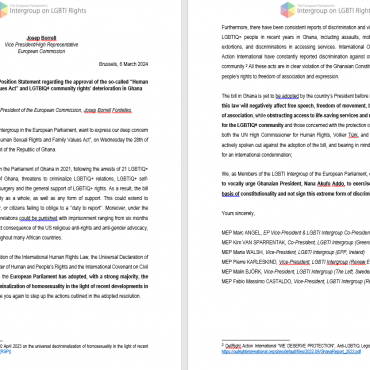Letter: MEPs address government of North Macedonia concerning Legal Gender Recognition and the Civil Registry Law

Prime Minister, Dimitar Kovachevski
1st Deputy Prime-Minister & Minister for Political System and Inter-community Relations, Artan Grubi
Deputy Prime Minister for European Affairs, Bojan Marichic
Minister of Justice, Nicola Tupancheski
Brussels, 20 April 2022
Subject: The need to ensure the right of trans and non-binary persons to Legal Gender Recognition in the Civil Registry law
Dear Prime-Minister, Dimitar Kovachevski,
Dear First Deputy Prime-Minister and Minister for Political System and Intercommunity Relations, Artan Grubi,
Dear Deputy Prime-Minister for European Affairs, Bojan Marichic,
Dear Minister of Justice, Nikola Tupancheski,
We, the undersigned Members of the European Parliament, address you today concerning the need to ensure the right of trans and non-binary persons to legal gender recognition in North Macedonia.
We have recently been informed of the withdrawal of the bill on Civil Registry, which included legal provisions regulating Legal Gender Recognition in national law. We were surprised with this development and the fact that the Committee on the Political System and Inter-Ethnic Relations of the Parliament did not have the chance to scrutinise the bill, which has been long awaited.
In effect, following the ruling of X v. the former Yugoslav Republic of North Macedonia in the European Court of Human Rights,[1]North Macedonia was required to adopt a legislative framework for the legal recognition of trans persons. As per the case:
¶69. All the above is sufficient for the Court to conclude that the current regulatory framework in the respondent State on legal gender recognition leaves a number of important questions unanswered. Among them is the existence and nature of any requirement that a claimant needs to fulfil in order to have the sex/gender marker in the official records changed. As noted[…], the domestic law does not address that issue.
¶70. The Court finds that the circumstances of the case reveal legislative gaps and serious deficiencies that leave the applicant in a situation of distressing uncertainty vis-à-vis his private life and the recognition of his identity. As stated above […], the protracted examination of the applicant’s claim, for which the national authorities bore sole responsibility, is having long-term negative consequences for his mental health. The foregoing considerations are sufficient to enable the Court to conclude that the current legal framework in the respondent State does not provide “quick, transparent and accessible procedures” for changing on birth certificates the registered sex of transgender people […].
The case therefore created a positive obligation on the executive of North Macedonia to regulate the situation, which it committed to doing in the framework of the Law on Civil Registry.
Dear Prime-Minister, dear Ministers, we take this opportunity to remind you of the annual report prepared by the Foreign Affairs Committee of the European Parliament on North Macedonia last year,[2] adopted by a majority of the Parliament’s Members, which stated:
¶40. Welcomes the renewed adoption of anti-discrimination legislation by all political parties, and welcomes the transparent process of appointment of the Commission for Protection from Discrimination, ensuring protection and inclusion of all marginalised groups; encourages the Sobranie to adopt legislation which will enable a simplified, transparent and accessible procedure for legal gender recognition based on self-determination, and prevent discrimination based on sexual orientation or gender identity; notes the organisation of the first ever Skopje Pride in June 2019;
We understand that the process to propose a legislation, which was even drafted in consultation with concerned civil society actors, was a lengthy process, but that a compromise agreement was found. Self-determination was not a part of this agreement, and neither was the requirement for compulsory divorce or the recognition of non-binary persons, but we were informed that civil society viewed it as a positive step in the right direction.
In accordance, we urge the government not to cease its efforts to propose legislation addressing the concerns of the civil society actors and LGBTIQ organisations, as well as implementing the obligations under the European Convention on Human Rights. This law has the potential to position North Macedonia as a progressive actor in the field of Legal Gender Recognition in the Balkans, and we urge the government to seize it and enact the needed legislative change.
We are positively looking forward to a reply on your behalf.
Yours sincerely,
Marc ANGEL, Co-Chair, LGBTI Intergroup (S&D)
Terry REINTKE, Co-Chair, LGBTI Intergroup (Greens-EFA, Vice-President)
Fabio Massimo CASTALDO, Vice-President, LGBTI Intergroup (Non-attached)
Pierre KARLESKIND, Vice-President, LGBTI Intergroup (Renew Europe)
Malin BJÖRK, Vice-President, LGBTI Intergroup (The Left)
Maria WALSH, Vice-President, LGBTI Intergroup (EPP)
Michal ŠIMEČKA, EP Vice-President
Frédérique RIES, Vice-President, Renew Europe
Marisa MATIAS, Vice-President, The Left
Cyrus ENGERER (S&D)
Evin INCIR (S&D)
Gwendoline DELBOS-CORFIELD (Greens-EFA)
José GUSMÃO (The Left)
Kim VAN SPARRENTAK (Greens-EFA)
Malte GALLÉE (G-EFA)
Monika VANA (Greens-EFA)
Niklas NIENASS (Greens-EFA)
Pernando BARRENA (The Left)
Rasmus ANDRESEN (Greens-EFA)
Sandro GOZI (Renew Europe)
Saskia BRICMONT (Greens-EFA)
Sirpa PIETIKÄINEN (EPP)
Sophie IN’T VELD (Renew Europe)
Thijs REUTEN (S&D)
[1] European Court of Human Rights in case of X v. the Former Yugoslav Republic of Macedonia (17 January 2019), Application no. 29683/16, accessible at https://hudoc.echr.coe.int/eng?i=001-189096.
[2] European Parliament resolution of 25 March 2021 on the 2019-2020 Commission Reports on North Macedonia (2019/2174(INI)), accessible at https://www.europarl.europa.eu/doceo/document/TA-9-2021-0114_EN.html.





